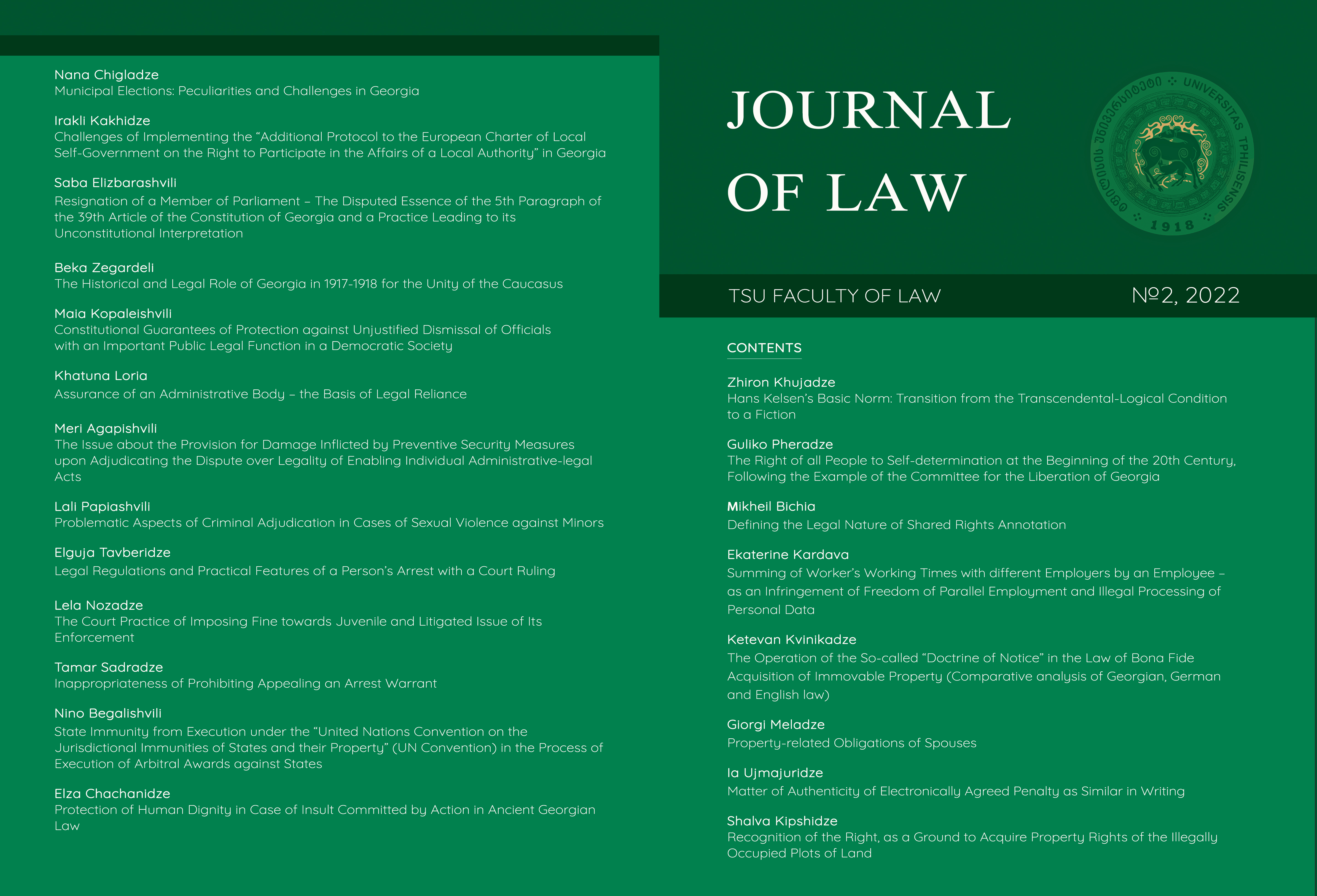Municipal Elections: Peculiarities and Challenges in Georgia
DOI:
https://doi.org/10.60131/jlaw.2.2022.7024Keywords:
Elections, local self-government, representative body of the municipality, executive body of the municipality, self-governing unit, election system.Abstract
After the restoration of independence, in the 90s, along with other vital issues of state importance, the process of bringing municipal democracy closer to the Georgian reality began actively. A number of factors prevented perfecting the local management system in Georgia, therefore, it is still in the process of reforming. The most important component, which enables municipal bodies to function in accordance with modern international standards and is a guarantee of effective self-government, is the rule of their formation.
Electiveness, that is, the possibility of people's participation in the creation and activities of municipal bodies, is a visible expression of the exercise of the right of local self-government. It is noteworthy that the municipal elections, in their essence, are characterized by a number of peculiarities and sharply differ from the elections of the central governmental institutions. Accordingly, national states, including Georgia, try to create legislation that is adapted to the political and social reality of their own country and reflects traditions and legislation which will provide the realization of real content of local self-government and the possibility of involvement of the population of the municipal unit. In the relevant electoral legislation, substantial changes were made more than once, which had a positive impact, mainly, on the result of the October 2, 2021 local self-government elections. Additionally, municipal electoral legislation and practice still face challenges, on which answers depends the future of Georgia as a democratic and legal state largely.
References
The Constitution of Georgia, 24/08/1995;
European Charter of Local Self-Government, 15/10/1985;
Organic Law of Georgia, Election Code of Georgia 27/12/2011;
Aleksidze T., Equal right of the electoral vote and an equal weight of electoral vote - international standards and local practice, Elections and Democracy, Journal No. 6, 2021, 36, 37 (in Georgian).
Arsenidze R., Democratic Republic, Chronicles of Georgian Constitutionalism, Zviad Kordzadze Publishing House, 2016, 61 (in Georgian).
Chavchavadze I., Publicist Letters, Volume IV, Life and Law, Letter Four, Tbilisi, 1987, 324 (in Georgian);
Ghlonti V., The Meaning of the Commune - on the Destination, “Eroba” newspaper, the the Union of Nations, No. 11 - 12, 1920, 22 (in Georgian);
Kandelaki K., History of Elections of Local Self-government Bodies, Elections and Democracy, Election Journal, No. 5, 2021, 7 (in Georgian).
Khmaladze V., New electoral system for the local self-government elections of October 2, 2021 - better representation in the search for democracy?, Elections and Democracy, Election Journal No. 6, 2021, 7-8, 11 (in Georgian);
Khubua G., “Parliamentization” of local self-government: risks and challenges, elections and democracy, election journal No. 7, 2021, 40-44 (in Georgian);
Losaberidze D., Kandelaki K., Abuladze M., Konjaria O., Local self-government, Green Caucasus, 2016, 126, 130 (in Georgian).
Losaberidze D., Report on Politics, Local Self-Government in Georgia, 1991-2014, International Center for Civic Culture, 2015, 15 (in Georgian);
Melkadze O., Georgian Municipalism, Tbilisi, 2009, 110 (in Georgian);
Election observation mission of the OSCE Office for Democratic Institutions and Human Rights (OSCE/ODIHR), local elections in Assembly, 2 October 2021 (in Georgian);
“Amendments to the Election Code: Assessment and Recommendations”, International Society for Fair Elections and Democracy, Transparency International - Georgia, 2021;
Decision of the Constitutional Court of Georgia on the case of Georgian citizen Kakha Kukava vs. Parliament of Georgia, No. 3/3/600, May 17, 2017;
International Election Observation Mission Georgia - Elections of municipal bodies, second round, October 30, 2021 (in Georgian);
Long-Term Small-Scale Election Evaluation Mission, Georgia 2021 Local Government Elections, Election Evaluation Report, National Democratic Institute, (NDI) September 1 - November 5, 2021, 2, 5-7, 11 (in Georgian);
Report on the October 2, 2021 elections of the representative body of the municipality - the assembly and the mayor of the self-governing city/self-governing community, (August 2 - November 13), CESKO, December 2021;
“Unity” magazine, No. 158, 25. 07. 1918.
Venice Commission – ODIHR Joint Opinion on the Draft Election Code of Georgia, CDL-AD(2011)043;
Decision of the Constitutional Court of Georgia on the case of Georgian citizen Giorgi Ugulava against the Parliament of Georgia, No. 3/2/574, May 23, 2014;
Decision of the Constitutional Court of Georgia on the case of Citizens of Georgia - Uta Lipartia, Giorgi Khmelidze, Eliso Janashia and Gocha Ghadua against the Parliament of Georgia, No. 1/2/213,243, February 16, 2005;
Decision of the Constitutional Court of Georgia on the case of “Citizens of Georgia - Salome Qinqladze, Nino Kvetenadze, Nino Odisharia, Dachi Janelidze, Tamar Khitarishvili and Salome Sebiskveradze vs the Parliament of Georgia", No. 3/2/588, April 14, 2016.
Downloads
Published
How to Cite
Issue
Section
License

This work is licensed under a Creative Commons Attribution-ShareAlike 4.0 International License.









